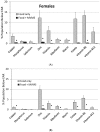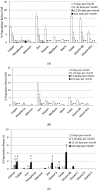Impact of Frequency of Multi-Vitamin/Multi-Mineral Supplement Intake on Nutritional Adequacy and Nutrient Deficiencies in U.S. Adults
- PMID: 28792457
- PMCID: PMC5579642
- DOI: 10.3390/nu9080849
Impact of Frequency of Multi-Vitamin/Multi-Mineral Supplement Intake on Nutritional Adequacy and Nutrient Deficiencies in U.S. Adults
Abstract
Although >50% of U.S. adults use dietary supplements, little information is available on the impact of supplement use frequency on nutrient intakes and deficiencies. Based on nationally representative data in 10,698 adults from the National Health and Nutrition Examination Surveys (NHANES) 2009 to 2012, assessments were made of intakes from food alone versus food plus multi-vitamin/multi-mineral supplements (MVMS) of 17 nutrients with an Estimated Average Requirement (EAR) and a Tolerable Upper Intake Level (UL), and of the status of five nutrients with recognized biomarkers of deficiency. Compared to food alone, MVMS use at any frequency was associated with a lower prevalence of inadequacy (p < 0.01) for 15/17 nutrients examined and an increased prevalence of intakes >UL for 7 nutrients, but the latter was ≤4% for any nutrient. Except for calcium, magnesium, and vitamin D, most frequent MVMS use (≥21 days/30 days) virtually eliminated inadequacies of the nutrients examined, and was associated with significantly lower odds ratios of deficiency for the examined nutrient biomarkers except for iron. In conclusion, among U.S. adults, MVMS use is associated with decreased micronutrient inadequacies, intakes slightly exceeding the UL for a few nutrients, and a lower risk of nutrient deficiencies.
Keywords: NHANES; dietary supplements; micronutrient; multi-vitamin/multi-mineral; nutrient deficiencies; nutritional adequacy; nutritional supplements; vitamins.
Conflict of interest statement
In addition to consulting work for the Campaign for Essential Nutrients (CFEN), the authors receive research support from USDA ARS grant 58-1950-014 (J.B.B.), NIH grant AT008754 (C.M.W.) and Nestle Nutrition (S.H.Z.). The authors serve on scientific advisory boards for AdvoCare (J.B.B.), Pfizer Consumer Healthcare (B.B.F., J.B.B.), Pharmavite (C.M.W., J.B.B.) and Metabolon (S.H.Z.). S.H.Z. is a founder of Nutrigene Sciences, LLC, a company in which he owns stock equity. V.L.F., as Senior Vice President of Nutrition Impact LLC, performs consulting and database analyses for various food and beverage companies and related entities. Neither CFEN nor its individual company members had any role in the design of this study; collection, analyses or interpretation of the data; or writing of the manuscript. The authors made the final decision to publish these findings.
Figures






Similar articles
-
Multivitamin/Multimineral Supplement Use is Associated with Increased Micronutrient Intakes and Biomarkers and Decreased Prevalence of Inadequacies and Deficiencies in Middle-Aged and Older Adults in the United States.J Nutr Gerontol Geriatr. 2019 Oct-Dec;38(4):307-328. doi: 10.1080/21551197.2019.1656135. Epub 2019 Sep 10. J Nutr Gerontol Geriatr. 2019. PMID: 31502930 Review.
-
Contribution of Dietary Supplements to Nutritional Adequacy in Various Adult Age Groups.Nutrients. 2017 Dec 6;9(12):1325. doi: 10.3390/nu9121325. Nutrients. 2017. PMID: 29211007 Free PMC article.
-
Contribution of Dietary Supplements to Nutritional Adequacy by Socioeconomic Subgroups in Adults of the United States.Nutrients. 2017 Dec 22;10(1):4. doi: 10.3390/nu10010004. Nutrients. 2017. PMID: 29271883 Free PMC article.
-
A comparison of micronutrient inadequacy and risk of high micronutrient intakes among vitamin and mineral supplement users and nonusers in Canada.J Nutr. 2012 Mar;142(3):534-40. doi: 10.3945/jn.111.149450. Epub 2012 Feb 1. J Nutr. 2012. PMID: 22298574
-
Inadequacy of Immune Health Nutrients: Intakes in US Adults, the 2005-2016 NHANES.Nutrients. 2020 Jun 10;12(6):1735. doi: 10.3390/nu12061735. Nutrients. 2020. PMID: 32531972 Free PMC article. Review.
Cited by
-
Multivitamin use and all-cause and cause-specific mortality in cancer survivors.Br J Cancer. 2024 Jan;130(1):82-87. doi: 10.1038/s41416-023-02421-9. Epub 2023 Nov 28. Br J Cancer. 2024. PMID: 38017130 Free PMC article.
-
Hidden Hunger: Solutions for America's Aging Populations.Nutrients. 2018 Sep 1;10(9):1210. doi: 10.3390/nu10091210. Nutrients. 2018. PMID: 30200492 Free PMC article. Review.
-
Calcium.Adv Nutr. 2019 May 1;10(3):546-548. doi: 10.1093/advances/nmy086. Adv Nutr. 2019. PMID: 30915443 Free PMC article.
-
Consideration for Flavonoid-Containing Dietary Supplements to Tackle Deficiency and Optimize Health.Int J Mol Sci. 2023 May 12;24(10):8663. doi: 10.3390/ijms24108663. Int J Mol Sci. 2023. PMID: 37240008 Free PMC article. Review.
-
Multivitamin/Multimineral Supplementation Prevents or Reverses Decline in Vitamin Biomarkers and Cellular Energy Metabolism in Healthy Older Men: A Randomized, Double-Blind, Placebo-Controlled Study.Nutrients. 2023 Jun 9;15(12):2691. doi: 10.3390/nu15122691. Nutrients. 2023. PMID: 37375594 Free PMC article. Clinical Trial.
References
-
- U.S. Department of Health and Human Services. U.S. Department of Agriculture Scientific Report of the 2015 Dietary Guidelines Advisory Committee. [(accessed on 17 January 2017)];2015 Available online: http://health.gov/dietaryguidelines/2015-scientific-report/
-
- U.S. Department of Health and Human Services. U.S. Department of Agriculture . 2015–2020 Dietary Guidelines for Americans. 8th ed. USDA; Washington, DC, USA: 2015. [(accessed on 17 January 2017)]. Available online: http://health.gov/dietaryguidelines/2015/guidelines/
MeSH terms
Substances
Grants and funding
LinkOut - more resources
Full Text Sources
Other Literature Sources
Medical

